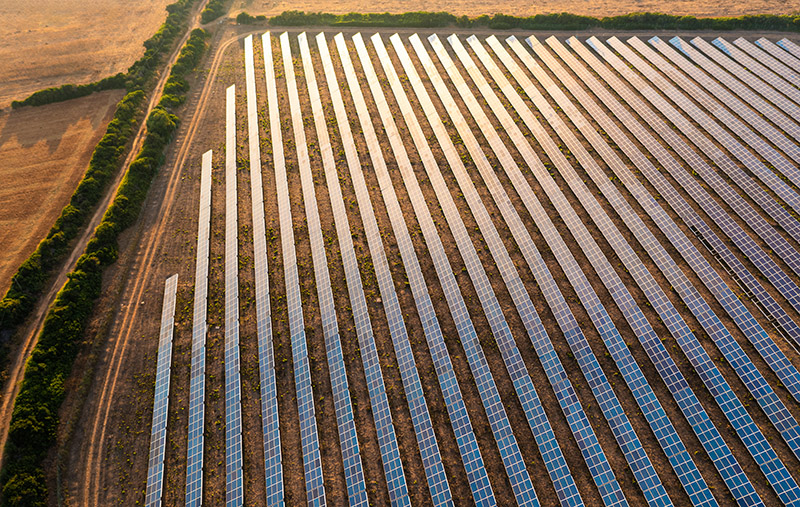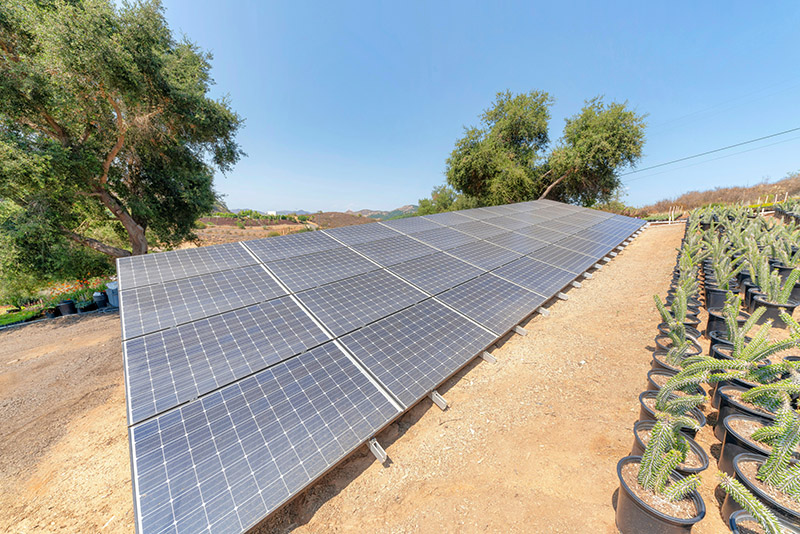If you’re looking for an eco-friendly energy solution, installing solar panels is something that must have come to your mind. This is no doubt a great decision because using renewable energy will help a lot in curbing global warming. In your quest to find solar panels, it’s easy to be confused about which one is the best option for your needs, whether to get ground-mounted or rooftop solar panels.
In this guide, we’ll take a look at why you should consider ground-mounted solar panels by looking at the advantages they offer. This will allow you to see whether these solar panels will meet your renewable energy needs. Without further ado, let’s get started.
What Are Ground-Mounted Solar Panels?
As the name suggests, ground-mounted solar panels refer to a free-standing solar array positioned on the ground either atop one pole or on a robust metal frame. These solar panels are often referred to as ground-mount, and it’s pretty simple to see why because they’re installed on the ground instead of on your roof.
The photovoltaic equipment in ground-mounted solar systems works identically to the rooftop solar panels by converting sunlight into electricity. But instead of being placed on the roof, ground-mounted solar panels are positioned on the ground at a 30-degrees angle for maximum light absorption, thereby maximizing output.
What Are the Benefits Of Ground-Mounted Solar Panels?
There are several reasons why ground-mounted solar panels, which you can buy from a supplier such as Impact Energy, are a better pick than the rooftop solar systems, and these include;
1. Easy to Clean and Maintain
Because ground-mounted solar panels are placed on the ground and not on the roof, they’re easier to clean and maintain. With their position on the ground, you save yourself the stress of climbing ladders. As a result, this makes cleaning and maintaining them a lot easier and ideal, especially if you’re doing it as a DIY project.
Since it’s easier to clean ground-mounted solar panels, you can ensure they remain free of dirt and debris that can block sunlight from hitting the cells. The ground-mounted solar panels are also easier to maintain and repair possible defects such as the inverter failing. In addition, electricians or inspectors have a much simpler time inspecting ground-mounted solar panels. As a result, this lowers the overall cost of maintaining the solar panel system.
2. Higher Energy Production Due to Increased Efficiency
Another reason ground-mounted solar panels have become a popular choice in renewable energy production is that they generate higher energy due to their increased efficiency. They are positioned at an optimal angle to collect more sunlight. In contrast, this isn’t a privilege you can enjoy with rooftop solar panels because their positioning will depend on your roof’s orientation.
In contrast with roof-mounted panels, ground-mounted panels are mounted at a downward angle and collect more sunlight because their surface area is larger. In addition, ground-mounted panels can be installed closer together than roof-mounted panels because they aren’t subject to shading like roof-mounted panels are. The large surface area of ground-mounted panels allows for more efficient light absorption because of the greater amount of material available for absorption.
With this in mind, it’s evident that ground-mounted solar panels are generally more effective at capturing solar energy than roof-mounted systems because they can be placed closer together and at steeper angles.

3. Free Up Roof Space
Removing the solar panels from your roof not only frees up your roof space. Doing this also helps boost your house’s structural integrity because the roof doesn’t have the support of the added weight of the solar panels. With rooftop solar panels, you’ll need to drill any holes on the roof, which must be done by following certain guidelines. This isn’t an issue you’ll face when installing ground-mounted solar panels.
Ground-mounted solar panels also provide you with more aesthetic options for your house. So, if you’re looking at getting solar-paneled but want to display them prominently as an aesthetic feature, not just a functional one, ground-mounting is the way to go.
4. They’re A Lot Easier to Expand
Installing ground-mounted solar panels also provides you with added flexibility. This is because, with ground-mounted solar panels, you can easily expand them should you want to increase your energy needs. After all, you don’t have to worry about finding space on your roof which is limited by the available space.
Therefore, you should consider getting ground-mounted panels if you want to expand your energy needs in the future. Despite being more expensive to install than roof-mounted counterparts and requiring extra permits and inspections, they’re worth it if you have the space for them.
5. Easy to Install
Installing ground-mounted panels is a simple process that involves digging holes in the ground and then cementing the panels into them. It’s more complicated than setting them on your roof, but it means that you don’t have to sacrifice any roof space for your solar power.
Ground-mounted solar panels also allow for a lower profile than their rooftop counterparts. This means you can install them on a surface like a porch where there isn’t much room to spare above the roofline. Because of this low profile, you can place them closer to your home than with typical rooftop setups, making them less imposing on your home’s appearance.
6. Maximize Idle Land Space
Ground-mounted systems allow the homeowner to maximize the ideal land space by using areas that wouldn’t otherwise have been possible with rooftop panels. Idle land space can refer to any unused space in your yard—a portion of your backyard that isn’t being used for anything or a side yard between two buildings and not getting used as an extension of your house. Efficiency makes them ideal for maximizing idle land space. This idle space can be a good option to install your ground-mounted solar panels.
Ground-mounted panel system also doesn’t have the same restrictions as rooftop solar panels, like not being able to be too close to trees or other obstacles.
7. More Ventilation for the Solar Panels
As you may or may not know, solar panels need a little extra ventilation to operate properly. Ventilation is needed because the solar panels are directly exposed to the sun and can get pretty hot during the summer months. This occurs when there’s no breeze to cool them down and when they aren’t receiving enough shade from nearby buildings or trees.
Ground-mounted solar panels create more ventilation which helps prevent negatively affecting their efficiency. By removing the bulky frames of standard rooftop systems, ground-mounting allows for greater airflow between the panels and the ground. This means that any dirt or debris will be carried away from the panels more easily, ensuring that they stay free from obstruction.
8. It Doesn’t Destroy Your Roof
Ground-mount solar panel systems differ from their rooftop counterparts in that they are installed on the ground and don’t require a separate roof structure on top of the home. Therefore, installing ground-mounted solar panels doesn’t destroy your home’s roof, unlike rooftop solar panels.
So, if you’re thinking about installing solar panels at home but are worried about what it will do to your roof, ground-mounted might be a better choice. Instead of being placed on the roof, ground-mounted solar panels, which consist of a well-engineered system of concrete footings and columns, are installed on the ground.
9. Reduced Electrical Hazards
Installing rooftop solar panels exposes your home to the risk of lightning and increases the chances of an electrical fire. This happens because lightning directs a lot of high voltage to your home. In addition, rooftop solar panels increase the likelihood of damage or fire because of faulty grounding.
But with the ground-mounted solar panels, the risk of your home experiencing electrical hazards is much lower. This is usually because ground-mounted solar panels are placed closer to the ground. As a result, they aren’t prone to experiencing grounding issues, usually as the solar panels get older.
10. Perfect For Rural or Suburban Settings
You should also consider ground-mounted solar panels if your yard is big enough. The open spaces where you place the solar panels need to be free of obstructions such as buildings, fences, or trees. It’s also best to place the solar panels far from property lines to prevent future issues with your neighbors if they decide to plant trees or start building.
But before installing these solar panels, you first need to assess your energy needs to know how much electricity is required. After that, you can look for solar panels that are perfect for your energy needs.
Takeaway
Renewable solar energy is the way to go as this helps protect the environment from the increased global warming plaguing the world today. As an environmentally conscious individual, installing solar panels is the way to make sure that you play your part in this fight against environmental degradation. And to help you know if ground-mounted solar panels are an ideal pick, this blog post has outlined the various benefits you’ll enjoy from installing them.

